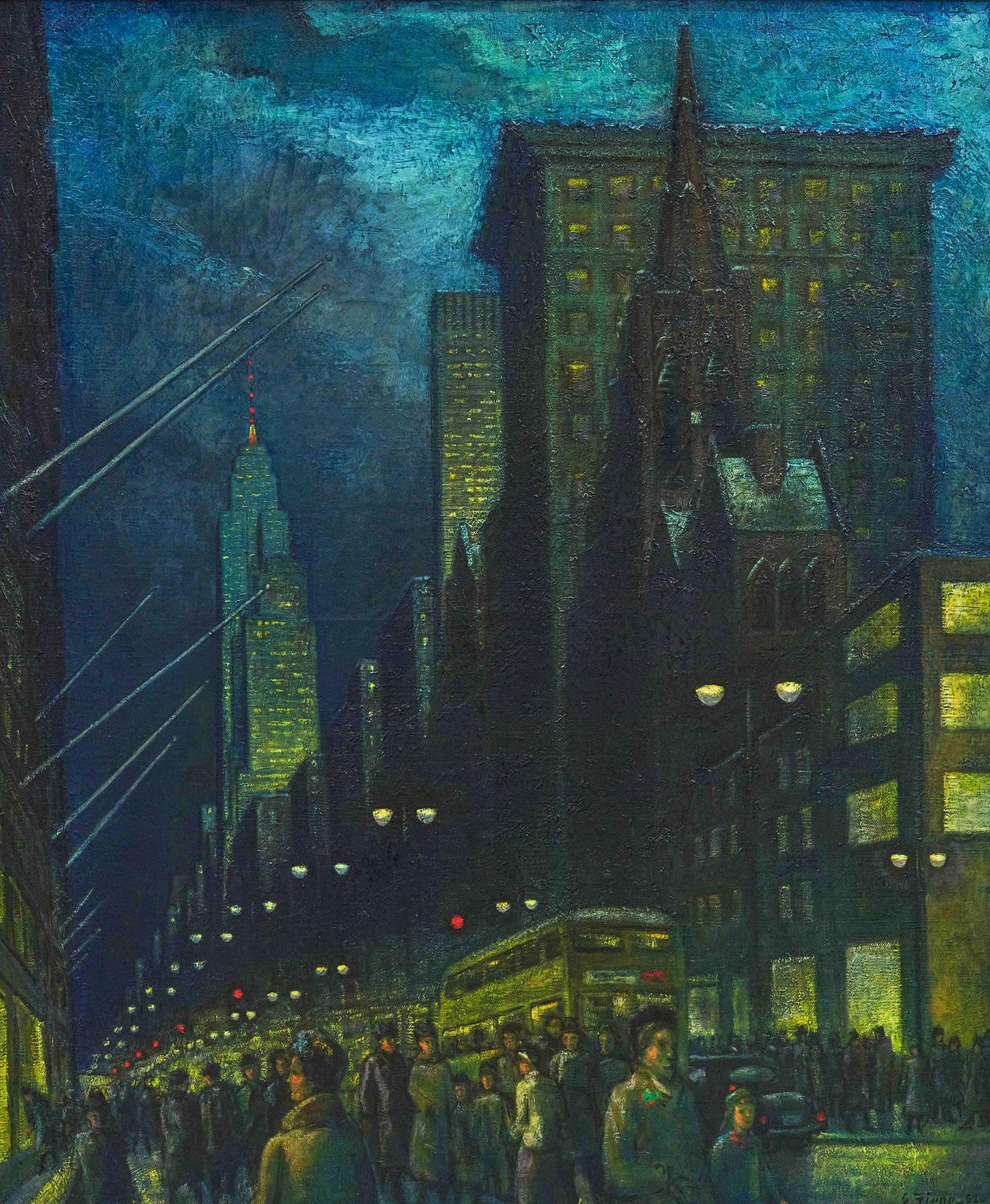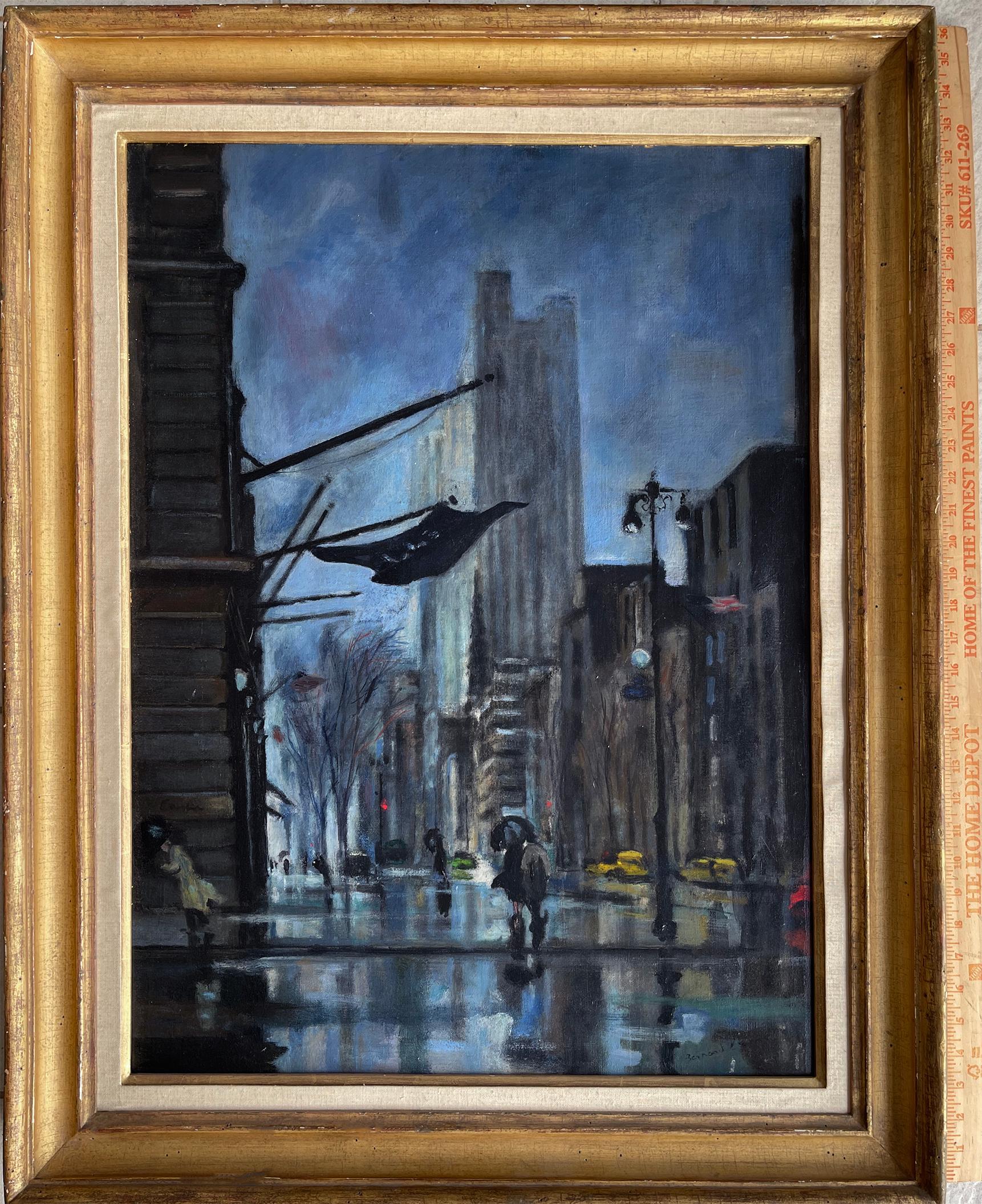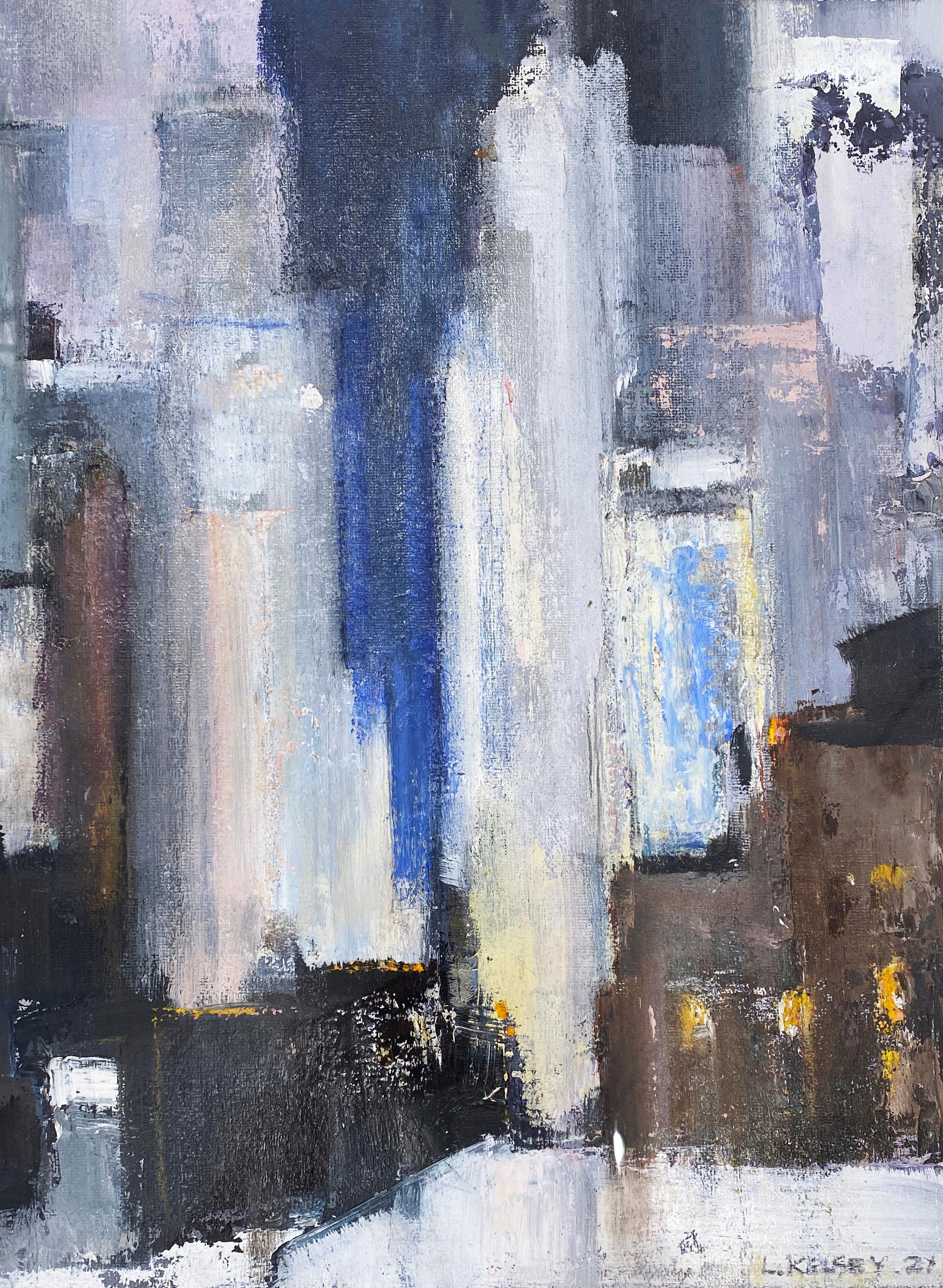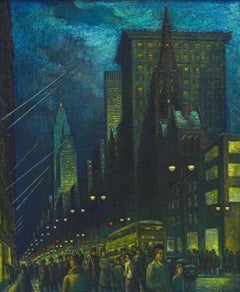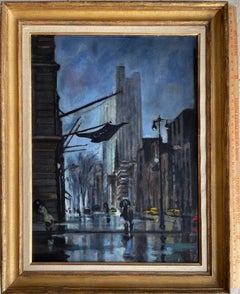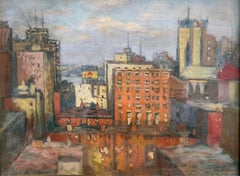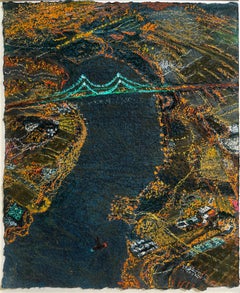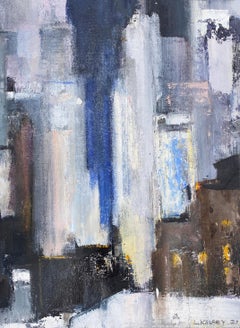Items Similar to Winter Evening Fifth Avenue - New York at Night - Mid-Century.
Want more images or videos?
Request additional images or videos from the seller
1 of 14
Ernest FieneWinter Evening Fifth Avenue - New York at Night - Mid-Century.1952
1952
$70,000
£53,152.66
€60,784.03
CA$97,800.15
A$108,775.12
CHF 56,798.99
MX$1,323,677.46
NOK 725,409.72
SEK 680,306.34
DKK 453,654.54
Shipping
Retrieving quote...The 1stDibs Promise:
Authenticity Guarantee,
Money-Back Guarantee,
24-Hour Cancellation
About the Item
Mid-century New York City is represented as a moment in time. The artist populates his scene with isolated figures that are more shapes of people as opposed to specific individuals. Ernest Fiene depicts Fifth Avenue looking down from 57th Street with an unobstructed view of the Empire State Building. The absence of newer glass and steel architecture gives the painting the charm of old New York. The artist captures a moody blue sky as light bounces back from the clouds. This contrasts with the somewhat haunting yellow glow given to the pedestrians and street traffic. The people have somewhat of a zombie quality akin to George Tooker. Best viewed with a top and direct gallery light to bring out color. With a side light you will get some refections off the canvas so light it properly. Provenance: Property from the Estate of Eleanor Jacobs.
- Creator:Ernest Fiene (1894-1965, American)
- Creation Year:1952
- Dimensions:Height: 36 in (91.44 cm)Width: 30 in (76.2 cm)
- Medium:
- Movement & Style:
- Period:
- Condition:Good, The painting is covered in an older varnish that is creating yellowing and accentuating reflections. Best view with a top light. Craqueleur throughout.
- Gallery Location:Miami, FL
- Reference Number:1stDibs: LU385310240722
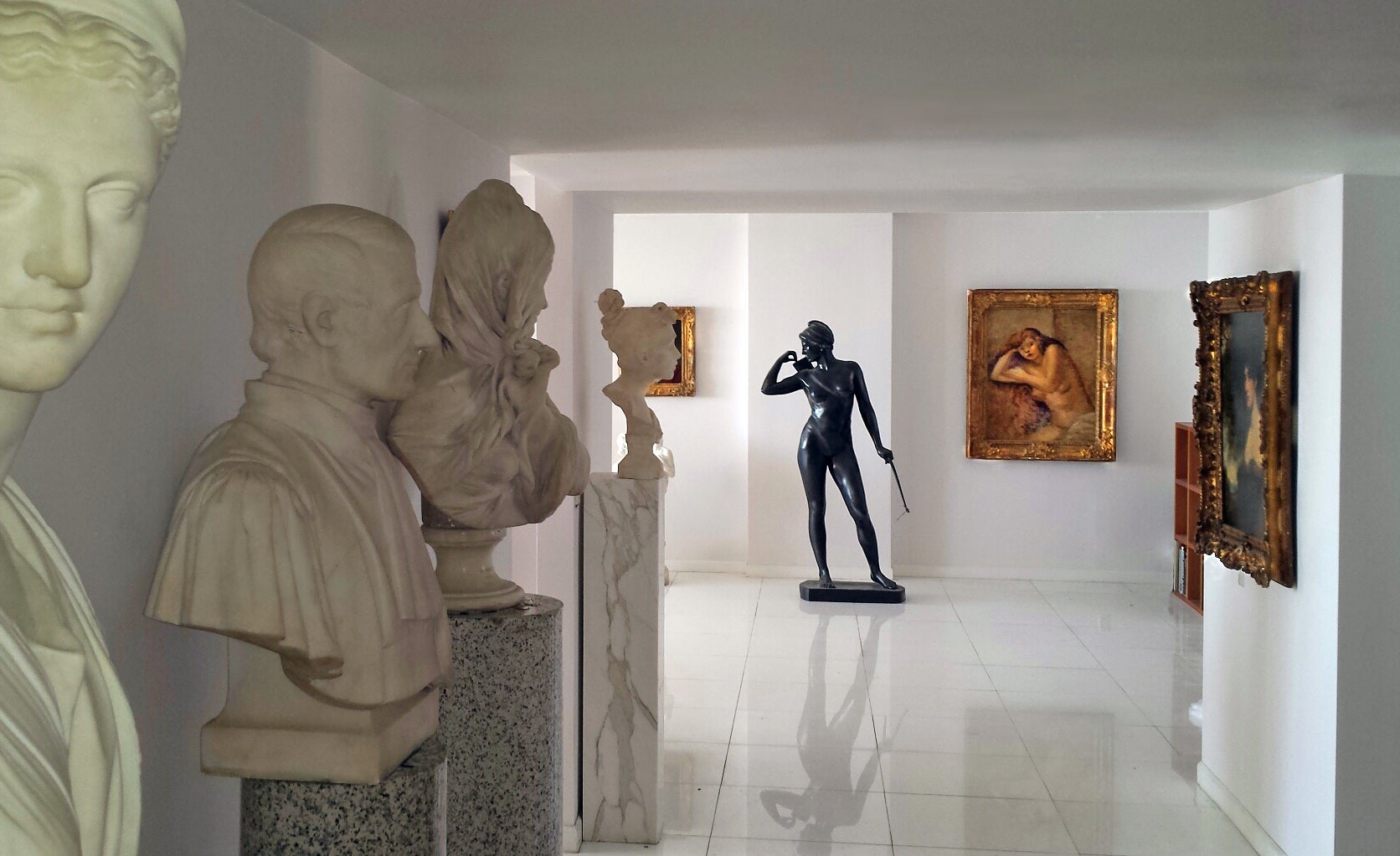
About the Seller
4.9
Gold Seller
Premium sellers maintaining a 4.3+ rating and 24-hour response times
Established in 2005
1stDibs seller since 2016
115 sales on 1stDibs
Typical response time: 1 hour
- ShippingRetrieving quote...Shipping from: Miami, FL
- Return Policy
Authenticity Guarantee
In the unlikely event there’s an issue with an item’s authenticity, contact us within 1 year for a full refund. DetailsMoney-Back Guarantee
If your item is not as described, is damaged in transit, or does not arrive, contact us within 7 days for a full refund. Details24-Hour Cancellation
You have a 24-hour grace period in which to reconsider your purchase, with no questions asked.Vetted Professional Sellers
Our world-class sellers must adhere to strict standards for service and quality, maintaining the integrity of our listings.Price-Match Guarantee
If you find that a seller listed the same item for a lower price elsewhere, we’ll match it.Trusted Global Delivery
Our best-in-class carrier network provides specialized shipping options worldwide, including custom delivery.More From This Seller
View AllWinter Evening Fifth Avenue - New York at Night
By Ernest Fiene
Located in Miami, FL
Ernest Fiene depicts Fifth Avenue looking down from 57th Street with an unobstructed view of the Empire State Building. The absence of newer glass and steel architecture gives the painting the charm of old New York. The artist captures a dark, moody blue sky as light bounces back from the clouds. This contrasts with the somewhat haunting yellow glow given to pedestrians and street traffic. The people have somewhat of a zombie quality akin to George Tooker. Best viewed with a top and direct gallery light...
Category
1950s Post-Impressionist Landscape Paintings
Materials
Canvas, Oil
New York City Rainy Night Street Scene in Blue
By Bernard Lamotte
Located in Miami, FL
Moody blue night with rain and wind rendered in a post-impressionist style somewhat like that of Albert Marquet
Category
1950s Post-Impressionist Landscape Paintings
Materials
Canvas, Oil
New York Skyline the West Side with Hudson River - Vintage New York
By Frank S. Hermann
Located in Miami, FL
Rooftop view of the upper West Side Manhattan as it looked in the 1930s. There is a rough indication of a billboard and a glimpse of the Hudson River. The cluster of buildings depic...
Category
1930s American Impressionist Landscape Paintings
Materials
Oil, Gouache, Board
Metropolitan Fantasy - City at Night with Pulsing Lights
By Yvonne Jacquette
Located in Miami, FL
Yvonne Jacquette uses pastel on a heavy rag paper to depict an ariel city scene at night with pulsing lights. There is a heavy texture to the paper and the surface is rich and vibra...
Category
1990s American Modern Landscape Paintings
Materials
Pastel, Rag Paper
Street Life New York - Haunting Faces Windows Expressionism Mid-Century
By Lawrence Kupferman
Located in Miami, FL
Mid-century artist Lawrence Kupferman paints a madly eerie New York street scene. An exaggerated upward view of two 19th-century walk-ups is split by a forced perspective of a downwa...
Category
1940s Expressionist Figurative Drawings and Watercolors
Materials
Paper, Ink, Watercolor, Pen
Gritty Street Scene with Parked Cars - Roaring Twenties New York
By Ruth Light Braun
Located in Miami, FL
A gritty New York City street scene with period Roaring Twenties Cars and stuffed metal garbage cans is depicted by female artist Ruth Light Braun. ...
Category
1920s Post-Impressionist Landscape Drawings and Watercolors
Materials
Paper, Crayon
You May Also Like
"6th Avenue El" American Scene Social Realism Mid-20th Century New York City
By Ernest Fiene
Located in New York, NY
"6th Avenue El" American Scene Social Realism Mid-20th Century New York City
Ernest Fiene (1894-1965)
"6th Avenue El"
12 1/4 x 14 1/4
Oil on canvas board, c. 1940s
Signed lower righ...
Category
1940s American Modern Figurative Paintings
Materials
Oil, Board
Oil Painting by Lawrence Kelsey 'City At Night'
By Lawrence Kelsey
Located in White Plains, NY
'City At Night' 2021 by American artist, Lawrence Kelsey. Oil on canvas, 14.5 x 11 in. / Frame: 20 x 16 in. Depicting a night view of New York City, this impressionistic painting inc...
Category
21st Century and Contemporary American Impressionist Landscape Paintings
Materials
Canvas, Oil
Road Repairing, Lower Manhattan at Night
Located in Los Angeles, CA
Road Repairing, Lower Manhattan at Night, 1934, oil on Masonite, signed and dated lower right, 24 x 16 inches; original label verso has title and address
Margit Varga was an artist,...
Category
1930s American Modern Landscape Paintings
Materials
Masonite, Oil
NYC Cityscape American Scene WPA Modern Realism Mid 20th Century Architectural
By Ernest Fiene
Located in New York, NY
NYC Cityscape American Scene WPA Modern Realism Mid 20th Century Architectural
Ernest Fiene (1894-1965)
Cityscape
36 x 30 inches
Oil on canvas
Signed and dated 1930. lower right
Provenance
Estate of the artist.
ACA Galleries, New York
Exhibited
New York, Frank Rehn Gallery, Changing Old New York, 1931.
New York, ACA Galleries, Ernest Fiene: Art of the City, 1925-1955, May 2-23, 1981, n.p., no. 5.
BIO
Ernest Fiene was born in Elberfeld, Germany in 1894. As a teenager, Fiene immigrated to the United States in 1912. He studied art at the National Academy of Design in New York City from 1914 to 1918, taking day classes with Thomas Maynard and evening classes with Leon Kroll. Fiene continued his studies at the Beaux-Arts Institute of Design in New York from 1916 to 1918, adding classes in printmaking at the Art Students League in 1923.
Fiene began his career as an artist in 1919 with his first exhibition of watercolors at the MacDowell Club arranged by his mentor Robert Henri. In 1923 the Whitney Studio Club mounted a large exhibition of his works. The following year he had an exhibition at the New Gallery in New York, which completely sold out all fifty-two works, including paintings, watercolors, drawings, and etchings. With the proceeds of sales from the New Gallery exhibition, Ernest Fiene and his younger brother Paul, a sculptor, built studios in Woodstock, New York in 1925.
In the early Twenties Ernest Fiene painted mostly landscapes of Woodstock and both the Ramapo and Hudson River Valleys. The first monograph from the Younger Artists Series was published on Fiene in 1922. Published in Woodstock, the series went on to include Alexander Brook, Peggy Bacon, and Yasuo Kuniyoshi. The book reproduced 1 illustration in color and another 27 reproductions in black and white. Around 1925 Fiene became fascinated with the intensity, excitement, and opportunities for color harmonies New York City offered as a subject. His paintings shifted to urban and industrial themes with architecture, industry, and transportation becoming his subjects.
By 1926 Fiene had attracted the dealer Frank K.M. Rehn, who gave him a one-man exhibition that year, which travelled to the Boston Arts Club. C.W. Kraushaar Galleries gave Fiene a one-man exhibition of urban, landscape, portrait, and still life paintings in 1927. Julianna Force, the director of the Whitney Studio Club and first director of the Whitney Museum of American Art, included two of Fiene’s paintings in a fall exhibition in 1928. The Whitney Studio Club showed Fiene’s paintings in a two-man exhibition with Glenn O. Coleman that year and acquired three of Fiene’s paintings. Also in 1928 Fiene became affiliated with Edith Halpert’s Downtown Gallery where he had an exhibition of 20 lithographs in the spring. Fiene sold his house in Woodstock in 1928 to spend more of his time in New York City.
With so many successful exhibitions, Fiene returned to Paris in 1928-29 where he rented Jules Pascin's studio and studied at the Académie de la Grande Chaumière. In France, Fiene painted both landscape and urban subjects developed from ideas influenced by Cubist geometry and the use of flat areas of broad color. Upon returning to New York in 1930, Fiene used this new approach to continue to paint New York skyscraper and waterfront subjects, as well as to begin a series of paintings on changing old New York based on the excavations for Radio City Music Hall and the construction of the Empire State Building. Frank K.M. Rehn Galleries exhibited this series, titled “Changing Old New York,” in 1931. Fiene also has solo exhibitions at Rehn Galleries in 1930 and 1932. Fiene’s oil paintings are exhibited at the Chicago Arts Club in 1930 as well.
Fiene was included in the Museum of Modern Art’s exhibition Painting and Sculpture by Living Americans in December of 1931. Visiting New York, Henri Matisse saw the exhibition and called Fiene’s Razing Buildings, West 49th Street the finest painting he had seen in New York. Fiene had two mural studies from his Mechanical Progress series exhibited at the Museum of Modern Art’s exhibition Murals by American Painters and Photographers in 1932. Fiene sent View from my Window which depicts Fiene working on a lithograph stone while looking out his window to the newly completed Empire State Building to the Carnegie International in 1931. In 1932 Fiene participated in the first Biennial of American Painting at the Whitney Museum and his prints were included in exhibitions at the Downtown Gallery and the Wehye Gallery. In the same year, Fiene was awarded a Guggenheim fellowship to further study mural painting in Florence, Italy.
On his return from Italy in 1933 Fiene re-engaged himself in New York City life and won several public and private mural projects. Fiene resumed his active exhibition schedule, participating in two group exhibitions at the Whitney Museum and a one-man exhibition of recent paintings at the Downtown Gallery in January 1934. In 1933 he purchased a farm in Southbury, Connecticut, which added Connecticut scenes to his landscape subjects. This was also the year Fiene began to spend summers on Monhegan Island, Maine, where he painted seascapes, harbor scenes, and still lifes.
Fiene’s landscape paintings attracted numerous commissions as part of the American Scene movement. Through the fall and winter of 1935-36, Fiene took an extended sketching trip through the urban, industrial, and farming areas of Pennsylvania and West Virginia. Most of the twenty-four Pennsylvania urban and rural paintings...
Category
1930s American Modern Landscape Paintings
Materials
Canvas, Oil
“New York at Night”
By Leon Dolice
Located in Southampton, NY
Very well executed original pastel on archival paper of New York City at night with beacon by the well known American artist, Leon Dolice. Signed lower right. Circa 1930. Condition is excellent. Beautifully gallery framed with stained mahogany wood frame. Under glass. Overall framed measurements are 21 by 30 inches. Birham Wood Galleries, East Hampton, New York provenance. Exhibited artwork. See photo gallery labels verso.
Leon Dolice was born in Vienna, Austria on August 14, 1892, the son of a machinest/welder. He went on to study art in Europe and viewing the works of the Masters. Dolice immigrated to the United States in 1920, finding a retreat in the European Bohemianism of Greenwich Village, he picked the streets of this landmark neighborhood as his first subjects. Concentrating on etching and with the encouragement of new found friends and artists such as George Luks and Herb Roth, he soon ventured out and devoted all his time to chronicling the architecture, back streets, dock scenes and other nostalgia that was fast disappearing from the face of Manhattan, mainly in copperplate etchings. A favorite subject for him was the Third Avenue El near one of his New York City studios on Third Avenue. He won accolades for his work, and although he traveled the East Coast recording landmarks in other cities including Washington DC, Baltimore, Chicago and Philadelphia, he always returned to his new home Manhattan.
A decline in popular favor for etchings led him to put aside his plates in the late 1930s and devote some ten years to pastels, linocuts and painting. His subject matter was almost exclusively New York City street scenes, but figurative works, country scenes, and even experiments with Abstract Expressionism at the height of its new found favor in the 1940s punctuated his career.
In 1953, after learning of the forthcoming demise of the Third Avenue El, in the shadow of which he had maintained his studio for over a decade, he once again took to his plates and press and created a final series of Third Avenue and or other New York City landmarks that were then threatened with extinction. His work brings to light aspects of nostalgic New York that survives today only in small part, whether in architecture or in spirit.
Dolice's works are in a number of notable museums and private collections, including the Museum of the City of New York; The New York Public Library Print Collection; The New York Historical Society; Georgetown University Lauinger Library; The Print Club of Philadelphia and others. In the past few years, his work has been exhibited at Hofstra Museum, Long Island, NY; with the Montauk...
Category
1930s American Modern Landscape Drawings and Watercolors
Materials
Oil Pastel, Archival Paper
"Times Square" Mid 20th Century 1937 Modernism Broadway Drawing NYC Cityscape
Located in New York, NY
"Times Square" Mid 20th Century 1937 Modernism Broadway Drawing NYC Cityscape
Philip Goodwin (20th Century) "Times Square," 23 ½ x 17 ¼ inches. Gouache...
Category
1930s American Modern Landscape Drawings and Watercolors
Materials
Paper, Gouache
More Ways To Browse
New York City Oil Painting Building
Paintings Of New York City At Night
Winter Night Painting
New York Empire State Building
Fifth Avenue Painting
Empire State Building Painting
Empire State Building Vintage
Zombie Glass
Vintage Street Scene Oil Paintings
Tour De France
Paintings By Chase
Pink And Green Landscape Paintings
Oil Painting Grass
Dutch School Oil Paintings
Dutch Signed Landscape Paintings
Vintage Southwest
California Plein Air
19th Century Painting With A River
